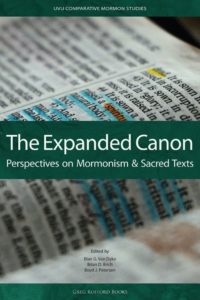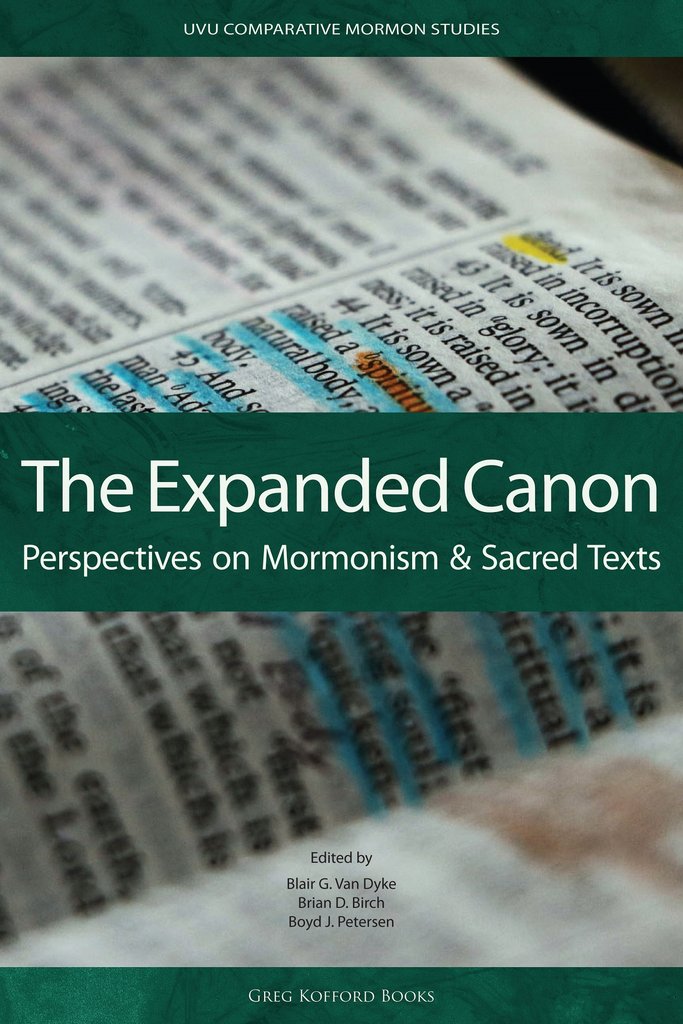 At this moment, with the 2018 October General Conference just weeks away, many Latter-day Saints are—consciously and unconsciously—going through in their minds and hearts how they view and feel about teachings from the church’s top leaders. What is their authoritative status? Are they to be considered on par with (or even superior and more authoritative than) the teachings found within the Standard Works? And what about our own personal revelation on particular subjects? How does that fit into the mix with scripture and statements and teachings from LDS general authorities? Do we leave aside our own sense of what God has led us to believe and simply shape our worldviews according to the leaders’ teachings because they can’t/won’t lead us astray? Or do we wrestle and seek a way to honor all these sources of authority? This episode discusses these and other dilemmas related to what makes something “canonical” (in some way)—for the church as a whole, and/or for each of us personally.
At this moment, with the 2018 October General Conference just weeks away, many Latter-day Saints are—consciously and unconsciously—going through in their minds and hearts how they view and feel about teachings from the church’s top leaders. What is their authoritative status? Are they to be considered on par with (or even superior and more authoritative than) the teachings found within the Standard Works? And what about our own personal revelation on particular subjects? How does that fit into the mix with scripture and statements and teachings from LDS general authorities? Do we leave aside our own sense of what God has led us to believe and simply shape our worldviews according to the leaders’ teachings because they can’t/won’t lead us astray? Or do we wrestle and seek a way to honor all these sources of authority? This episode discusses these and other dilemmas related to what makes something “canonical” (in some way)—for the church as a whole, and/or for each of us personally.
In addition to the upcoming general conference, this conversation was prompted by a set of studies and essays that have been recently compiled together and published in a new volume: The Expanded Canon: Perspectives on Mormonism & Sacred Texts (Greg Kofford Books). In the episode, Mormon Matters host Dan Wotherspoon and the book’s three editors, Blair Van Dyke, Brian D. Birch, and Boyd J. Peterson share about the above, and other book topics. They go into those mentioned above, as well as the authoritative status of women’s writings, the nature of the shifts the church’s views on electronic publishing have undergone (are we seeing online versions of the scriptures and other teachings shared via the web as equal in status of the same things in print?), and also the authoritative status of official “Proclamations” the church has issued in the past, and recently, with a particular focus on “The Family: A Proclamation to the World.” To what degree are various Latter-day Saints incorporating this proclamation into their own “personal canon”?
Dan and the editors also briefly introduce other subjects taken on in the volume, such as the best way to approach reading scriptures, the place and role of the Golden Plates in LDS consciousness and conversation, how the Book of Mormon, Doctrine and Covenants, and Pearl of Great Price wound their way into canonical status, as well as the very character of each of the teachings within these books and what tasks or roles they perform in Mormon hearts and minds. They also overview a few particulars of most of the book’s other topics, including how one non-Mormon scholar of religion approaches LDS truth claims, especially those contained in discussions surrounding the Golden Plates: their finding, taking possession of, translating, and being revealed to chosen witnesses, and proposes a third way that falls between full belief in all the events as reported and the conclusion many land on: that Joseph Smith is fraud and deliberate deceiver. And finally, what about patriarchal blessings? How do Mormons view them and their role in their personal lives? Where do these reverenced spiritual creations fit in the idea of the Mormon (or personal) “canon” ?
The episode grounds itself in the book and its coming together, but The Expanded Canon is used primarily as a springboard for getting into the profound issues and the wrestles they generate for both the institutional church and its members. We think you will really enjoy what transpires in this two-part episode, and that you will come away with many things worth chewing on in your own church- and self-examinations.
_____
Links:
(Purchasing items through the links below benefits Mormon Matters. Or click on any of these and simply shop with Amazon for other things instead (or in addition), and any purchases will help support the podcast. Thank you!)
Blair Van Dyke, Brian D. Birch, Boyd J. Petersen, eds, The Expanded Canon: Perspectives on Mormonism and Sacred Texts (Greg Kofford Books, 2018)
Charles R. Harrell, “This Is My Doctrine”: The Development of Mormon Theology (Greg Kofford Books, 2011)
Ann Taves, Revelatory Events: Three Cases of of the Emergence of New Spiritual Paths (Princeton University Press, 2016)
Paul Reeve, Religion of a Different Color: Race and the Mormon Struggle for Whiteness (Oxford University Press, 2015)
______
Upcoming Events:
Colorado Faith Forums website. Learn about its annual symposium, 15 September 2018, Parker, Colorado, featuring Robert Rees, Julie M. Smith, LaShawn C. Williams, and Dan Wotherspoon.
Utah Valley University, Center for the Study of Ethics, 2018 Ethics Awareness Week, “Truth and Misinformation,” September 24-28th. This event is free and open to the public.
Mormon Matters Retreat, 12-14 October, Salt Lake City. Click here for details, registration information, and about scholarships to attend or to help others attend.


Comments 2
I agree with you Dan. Most organisations do change policy, beliefs, dogmas and doctrines because of public pressures and via the strength and power of the internet.
But this organisation; The Church of Jesus Christ of Latter Day Saints, self defines as a different, perhaps a singularly, exclusivist organisation.
It self identifies as the ‘one true church’. It cannot be so pigeon holed with other organisations. So the fact that other organisations change by public pressure, this cannot be the case with Jesus Christ.
How many times have church leaders said that it is Jesus Christ who directs his church, not the world?
Did not Jesus say several times ‘My kingdom is not of this wotld’
The church cannot claim to be Christ’s church and claim the frailties of other institutions. It is either the one or the other. And yes! I’m being very polarising aren’t I? But this is a polarity the church itself has set. Yet again shooting itself in the foot.
Cannot have it both ways.
I wonder sometimes how God or Christ directs his affairs. Is his voice not among those who cry out or protest publicly. Is his voice not spoken through scientific research or peer reviewed studies? If we take it even further one could say that God speaks through Polls and Surveys.
We may not see exactly in this way, but there’s something to be said of that too.